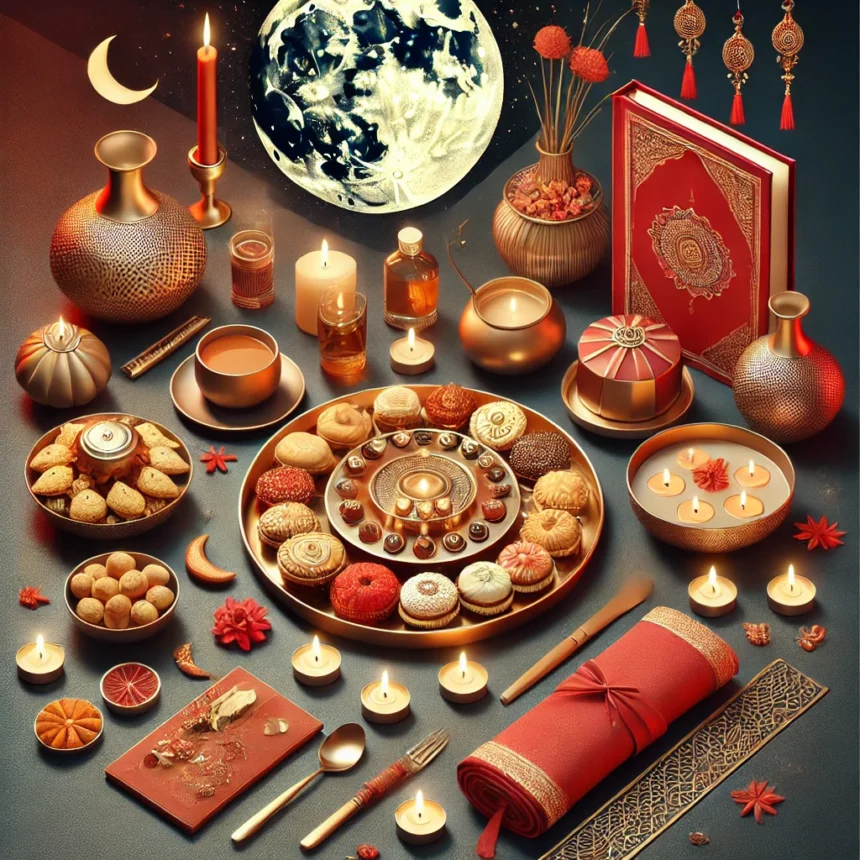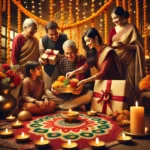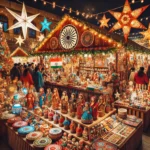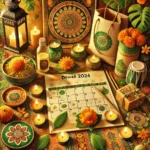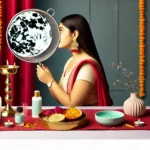Karva Chauth – A Celebration of Marital Bonds
Karva Chauth is a significant festival observed by married women, predominantly in North India, symbolizing the love, commitment, and devotion shared between a husband and wife. The festival holds a deep cultural and emotional resonance, where women fast from sunrise to moonrise, praying for the long life, health, and prosperity of their husbands. Over the years, Karva Chauth has transcended its traditional roots and evolved into a celebration of the strength of marital relationships, emphasizing the devotion and selflessness that underpin these bonds.
The festival is often marked by grand celebrations, elaborate rituals, and community gatherings where women come together to observe the fast, exchange stories, and perform traditional pujas. While Karva Chauth’s primary focus is on the marital bond, it also serves as a celebration of love, family, and togetherness. It is a day when women reaffirm their commitment to their spouses, and families come together to support and celebrate this enduring bond.
Much like Diwali, Karva Chauth also highlights the importance of gifting. Husbands often give their wives special gifts, ranging from traditional jewelry and sarees to personalized tokens of appreciation, as a way of expressing their love and admiration. In recent years, the exchange of gifts has become an integral part of the celebration, symbolizing mutual respect and appreciation between spouses.
The Significance of Karva Chauth: Strengthening Marital Bonds
Karva Chauth is more than just a day of fasting; it is a celebration of the sanctity of marriage and the strength of the marital relationship. The festival traces its roots back to ancient Hindu traditions and is believed to have originated in the northern regions of India, where women prayed for the safety and long life of their husbands, especially during times of war and hardship.
Cultural and Spiritual Importance
The cultural significance of Karva Chauth lies in its symbolism of love, loyalty, and devotion between married couples. The fast observed by women is considered an act of self-sacrifice, reflecting the depth of their love and commitment to their husbands. By abstaining from food and water for an entire day, women demonstrate their dedication and willingness to go to great lengths for the well-being of their spouse.
At its core, Karva Chauth is about the strength of the emotional bond between a husband and wife. It is believed that the fast invokes divine blessings, ensuring that the couple’s relationship remains strong and harmonious. The day is filled with prayers, rituals, and a shared sense of togetherness, as women come together to celebrate their collective devotion to their spouses.
Beyond the spiritual significance, Karva Chauth also represents the importance of family and community. Women often gather with their neighbors and friends to perform the rituals together, creating a sense of camaraderie and mutual support. The festival fosters a sense of unity among women, as they share their experiences and stories while preparing for the rituals, dressing up in traditional attire, and celebrating the beauty of marriage.
Regional Celebrations and Traditions
While Karva Chauth is primarily observed in North Indian states like Punjab, Haryana, Uttar Pradesh, and Rajasthan, the festival has gained popularity in other parts of India and among Indian communities abroad. In each region, the rituals and customs associated with Karva Chauth may differ slightly, but the essence of the festival remains the same.
• Punjab and Haryana: In Punjab and Haryana, Karva Chauth is celebrated with great enthusiasm. Women begin preparations days in advance, purchasing new clothes, jewelry, and puja items. On the day of Karva Chauth, women dress in their finest attire, often wearing red or bridal colors, and adorn themselves with traditional jewelry. The fast begins at sunrise, and women spend the day preparing for the evening puja, where they gather in groups to perform the rituals and pray for their husbands.
• Uttar Pradesh: In Uttar Pradesh, the festival is celebrated with a focus on traditional customs. Women gather in small groups to listen to the Karva Chauth katha (story), which narrates the origins and significance of the festival. This is followed by the offering of prayers and the exchange of karvas, small earthen pots filled with gifts, sweets, and bangles, symbolizing prosperity and good fortune.
• Rajasthan: In Rajasthan, Karva Chauth is marked by its colorful and vibrant celebrations. Women in Rajasthan celebrate the festival with elaborate rituals and grand feasts after the fast is broken. The day is also marked by the gifting of traditional items like leheriya sarees, bangles, and henna, adding to the festive spirit.
While the specific customs may vary across regions, the core values of love, loyalty, and devotion remain central to the celebration of Karva Chauth. It is a festival that transcends geographical boundaries, bringing together women to celebrate the strength of their relationships and the joy of marriage.
Unique Rituals and Customs of Karva Chauth
Karva Chauth is rich with rituals and customs that are passed down from generation to generation, adding to the festival’s charm and cultural depth. The observance of these traditions forms the heart of the celebration, making Karva Chauth a uniquely intimate and spiritual occasion for married women. From the early morning sargi to the evening moonrise rituals, each part of the day carries deep meaning and symbolism.
Sargi – The Early Morning Tradition
The day of Karva Chauth begins with sargi, an important pre-dawn meal traditionally prepared by a woman’s mother-in-law. This meal is shared before sunrise and holds significant cultural importance as it marks the start of the day-long fast. Sargi consists of a variety of nourishing and delicious items, such as sweets, fruits, and dry fruits, designed to sustain women throughout the fast.
The act of giving sargi is not just a practical one; it is also an emotional gesture symbolizing the bond between a woman and her in-laws. The tradition reflects the support and care that exists within families, as mothers-in-law offer their daughters-in-law strength and blessings for the day ahead. Sargi is seen as a way to pass on both love and the cultural values that come with observing the fast.
Solah Shringar – Dressing in Bridal Attire
One of the most beautiful customs of Karva Chauth is the tradition of Solah Shringar. This refers to the 16 adornments of a bride, and on Karva Chauth, married women dress as brides, celebrating their marriage by adorning themselves in vibrant, often red, bridal attire. Solah Shringar includes:
• Wearing traditional sarees or lehengas, typically in shades of red, pink, or gold, which are considered auspicious.
• Applying henna (mehndi) on their hands, symbolizing beauty and love. The darker the henna, the more it is believed to represent the husband’s love.
• Donning jewelry like bangles, earrings, necklaces, anklets, and mangalsutra.
• Beautifying themselves with kohl, sindoor (vermilion) on the forehead, and a bindi, all of which signify a married woman’s status in Indian culture.
This ritual of dressing up is more than just a physical adornment; it symbolizes the reverence and pride women take in their marital bond. Women across generations look forward to this moment, which evokes feelings of celebration, connection, and devotion.
Karva Chauth Katha – The Story Behind the Fast
One of the most important rituals of Karva Chauth is the listening of the Karva Chauth Katha (story), which recounts the legend behind the fast and its significance. Women gather in groups in the evening, typically just before the moon rises, to listen to this story as part of the puja.
The story of Karva Chauth varies slightly across regions, but a common theme revolves around loyalty, faith, and the power of devotion. In one popular legend, Queen Veeravati is said to have fasted for her husband’s long life, only to break the fast prematurely due to deception. This resulted in her husband’s death, but through her deep devotion and prayers, she was able to bring him back to life, thus restoring the importance of the fast.
During the katha, women offer prayers for the well-being of their husbands, using earthen pots known as karvas filled with rice, wheat, and water. These pots symbolize prosperity and the prayers for a fulfilling married life.
Detailed Evening Puja and Moonrise Rituals
The evening puja and moonrise rituals are the most anticipated and spiritually significant part of Karva Chauth. After a day of fasting and performing the day’s preparations, women gather in their homes or at a communal space to perform the puja and wait for the sighting of the moon, which marks the breaking of the fast. These rituals are deeply spiritual, filled with symbolism, and bring a sense of fulfillment to the women observing the fast.
The Evening Puja
The Karva Chauth puja is a collective celebration, often performed in groups where women gather to offer their prayers. The ritual setup includes:
• Karva (earthen pots): The pots are central to the puja and are filled with water and decorated with vermilion, turmeric, and flowers.
• Diya (oil lamp): A diya is lit as part of the puja, symbolizing the light of knowledge and the removal of darkness from life. This diya is central to the ritual and is used in the aarti (prayer) performed for the goddess.
• Puja Thali: Women prepare a special puja thali (a plate with offerings), which includes items like sindoor (vermilion), a small idol or picture of Goddess Parvati, incense sticks, flowers, and sweets.
Women sit in a circle with their puja thalis, and as the katha is narrated, they pass the karvas around, symbolizing the sharing of prosperity and good fortune. The puja thali is rotated while women chant prayers and songs, creating a vibrant and communal atmosphere. This collective prayer is believed to invoke blessings for the longevity and well-being of their husbands.
Moonrise Rituals
The fast of Karva Chauth is broken only after the moon is sighted. The moon, known as Chand, holds special significance in Hindu culture as a symbol of peace, calmness, and fertility. The moonrise ritual is the final and most important moment of the day.
Once the moon is visible, the women perform a special prayer by gazing at the moon through a sieve or water-filled vessel, symbolizing their devotion and respect. The sieve is believed to filter any negative energy, allowing only positive blessings to be received from the moon.
The ritual typically follows these steps:
1. Offering Water to the Moon: The women offer water to the moon from their karvas, symbolizing their prayers reaching the heavens. This act of pouring water is an offering of gratitude and devotion.
2. Moon Gazing through the Sieve: The women then look at the moon through the sieve, followed by gazing at their husbands through the same sieve. This act symbolizes their connection with the cosmos and their spouse, reaffirming their marital bond.
3. Breaking the Fast: After the prayers are completed, the husbands offer their wives water and food (usually the first bite is a sweet like a piece of fruit or sweet roti), symbolizing the breaking of the fast. The wives then drink water, completing the ritual and breaking their fast.
This moment is filled with love, emotion, and spiritual fulfillment, as the long day of fasting culminates in the blessings of the moon and the shared affection between husband and wife.
The Importance of Gifting on Karva Chauth
Gifting is an integral part of Karva Chauth, and it has become a way for husbands and families to express love, appreciation, and support. Over the years, the tradition of gifting on Karva Chauth has evolved, extending beyond just the husband-wife relationship to include gifts exchanged between mothers-in-law, daughters-in-law, and even among friends. Gifting on this day symbolizes gratitude, mutual respect, and the celebration of the special bond of marriage.
Gifts from Husbands to Wives
One of the most anticipated aspects of Karva Chauth for many women is the exchange of gifts from their husbands. This tradition is deeply symbolic, as it represents the husband’s appreciation for his wife’s devotion and love. The gifts are not just material tokens, but also gestures that reinforce the emotional connection between the couple.
Traditionally, gifts included jewelry, sarees, or other items of adornment that would highlight the wife’s beauty and symbolize prosperity. However, in modern times, the scope of gifting has expanded to include more personalized and thoughtful items. These can range from:
• Jewelry: Gold or diamond jewelry continues to be a popular choice, symbolizing wealth, prosperity, and timeless love.
• Clothing: Husbands often gift their wives beautiful sarees or lehengas, representing the occasion’s traditional and cultural values.
• Personalized Gifts: Personalized gifts such as custom-made jewelry, engraved items, or even hand-written love notes add a personal touch, showing the husband’s thoughtfulness and effort.
• Spa Packages or Experiences: Some husbands choose to give their wives experiences such as a relaxing spa day, a dinner date, or a romantic getaway, highlighting the importance of spending quality time together.
While the specific gifts may vary, the gesture itself serves as an affirmation of the couple’s commitment to one another and the respect they share in their marriage.
Gifts from Mothers-in-Law to Daughters-in-Law
In many families, the tradition of gifting extends to the relationship between the mother-in-law and the daughter-in-law. The mother-in-law often gives sargi, the pre-dawn meal, as part of this tradition. However, gifts are also exchanged as a way to strengthen the bond between the two, reflecting love, care, and support for the daughter-in-law’s observance of the fast.
These gifts can include:
• Traditional Jewelry or Clothes: Symbolizing family blessings and good fortune.
• Bangles and Henna: Gifts that are associated with marital bliss and beauty.
• Home Decor or Household Items: Practical gifts that signify the daughter-in-law’s role in the household and her contribution to the family’s well-being.
This exchange of gifts enhances the familial bond and brings women of different generations together, allowing them to celebrate their shared values and traditions.
Friendship and Gifting
Karva Chauth is also a time when women celebrate friendship and sisterhood. Friends and neighbors often gather during the day to share their experiences, perform the puja, and support each other in observing the fast. Gifting among friends on Karva Chauth is a gesture of love and camaraderie, and it is not uncommon for women to exchange gifts like sweets, bangles, or small tokens of appreciation as a way of celebrating their bond.
Gifting on Karva Chauth, whether between spouses, in-laws, or friends, goes beyond the material aspect—it strengthens relationships, fosters appreciation, and reinforces the sense of togetherness that the festival represents.
Other Cultural and Social Significance of Karva Chauth
While Karva Chauth is predominantly viewed as a festival centered around the marital relationship, its cultural and social significance extends much further. It is a festival that promotes values like love, loyalty, and devotion, while also fostering community bonding and shared experiences. In recent years, Karva Chauth has evolved to include modern interpretations of marriage, love, and mutual respect, making it more than just a traditional festival—it is a celebration of unity, support, and empowerment.
Promoting Loyalty and Devotion
At its heart, Karva Chauth promotes loyalty and devotion, values that are integral to a successful and lasting marriage. The fast observed by women is a symbol of the sacrifices and efforts they are willing to make for the well-being of their husbands. It highlights the importance of commitment and mutual respect in marriage.
While the fast is traditionally observed by women, there has been a growing trend in recent years where husbands, too, choose to fast alongside their wives, reflecting the evolving nature of marital relationships. This mutual observance of the fast signifies the equality and shared responsibilities in modern marriages, emphasizing that love and devotion are reciprocal.
Strengthening Community Bonds
Karva Chauth is not just about individual relationships; it is also about community and the support women offer one another. In many areas, women gather in groups to perform the evening puja together, creating a sense of unity and shared purpose. These gatherings are filled with conversations, laughter, and the exchange of stories, helping women connect with one another and build a strong sense of community.
This community bonding is an important aspect of Karva Chauth, as it reflects the collective strength and resilience of women. In a time when many women face the challenges of balancing multiple roles—whether as wives, mothers, professionals, or caretakers—Karva Chauth offers an opportunity to come together, celebrate their shared experiences, and support one another.
The Role of Media and Modern Interpretations
In recent years, the cultural portrayal of Karva Chauth in popular media, especially through films and television, has helped to spread awareness of the festival beyond its traditional boundaries. The festival is often depicted as a grand romantic occasion, where husbands and wives express their love and devotion to one another through the observance of the fast. This portrayal has contributed to the growing popularity of the festival among younger generations, who see Karva Chauth as both a cultural tradition and a celebration of love.
As the festival has gained prominence, its significance has evolved to reflect the values of modern relationships. Today, Karva Chauth is not just about a wife’s devotion to her husband; it is also about mutual love, respect, and partnership. This shift in perspective has made the festival more inclusive and reflective of contemporary ideas about marriage.
How Karva Chauth Gifting Strengthens Relationships
Gifting during Karva Chauth goes beyond material exchanges—it is a symbolic gesture that strengthens bonds, nurtures relationships, and expresses appreciation between spouses, in-laws, and friends. The significance of these gifts lies in the emotions behind them, as they represent love, respect, and a reaffirmation of lifelong commitments. Gifting on Karva Chauth serves as a bridge that deepens connections and helps celebrate the joy of marriage and family.
Husband-Wife Relationship
The gifting tradition between husbands and wives during Karva Chauth is one of the most intimate aspects of the celebration. The fast observed by the wife is a testament to her love and devotion, and the husband’s gesture of gifting reflects his appreciation for her selflessness. Whether it’s a piece of jewelry, a handwritten note, or a personalized gift, the exchange of gifts adds a layer of emotional connection to the day.
In modern times, many husbands choose to participate in the fast themselves, signaling a shift toward equality in marriage. This mutual observance of the fast, followed by the exchange of gifts, strengthens the marital bond and reinforces the idea that both partners are committed to each other’s well-being.
For couples, Karva Chauth provides an opportunity to reflect on their journey together, appreciate each other’s presence, and celebrate the enduring nature of their relationship. Gifts exchanged on this day become cherished tokens that remind them of their love and mutual respect.
Strengthening Family Ties
Karva Chauth is not only about the marital relationship but also about reinforcing family bonds, particularly the bond between a daughter-in-law and her in-laws. Gifts exchanged between mothers-in-law and daughters-in-law play a key role in strengthening this relationship. The mother-in-law’s gift of sargi in the morning and the daughter-in-law’s respect for her in-laws in the form of fasting creates a meaningful connection, rooted in tradition and family values.
These gifts are symbols of the family’s collective support, as both women celebrate their roles in the household. This exchange fosters harmony and strengthens the familial bond, especially in joint families where these relationships are integral to the fabric of daily life.
Friendship and Community Bonding
Karva Chauth also promotes the bonds of friendship and sisterhood among women. The shared experience of fasting, gathering for the puja, and performing rituals together brings women closer, creating an environment of mutual encouragement and support. Friends often exchange small gifts or tokens of appreciation to celebrate their camaraderie, acknowledging the importance of standing together in life’s journeys.
The act of gifting among friends adds joy to the celebration and fosters a sense of community. Whether it’s sharing sweets, bangles, or even supportive messages, these gestures emphasize the importance of friendships that empower and uplift one another.
Conclusion: Karva Chauth – A Celebration of Love, Devotion, and Togetherness
Karva Chauth is more than just a day of fasting—it is a celebration of love, devotion, and the unbreakable bonds that hold marriages and families together. As women come together to observe this age-old tradition, they reinforce the importance of loyalty, commitment, and mutual respect within their relationships. The rituals, the fasting, and the gifting that mark this day are all expressions of these core values, and they bring families closer while celebrating the institution of marriage.
In a world where time is often scarce and relationships can be strained by the demands of modern life, Karva Chauth serves as a reminder of the importance of nurturing and cherishing these bonds. The act of fasting and praying for one’s spouse is not just a tradition but a powerful expression of love and selflessness. Likewise, the exchange of gifts, whether between spouses, in-laws, or friends, reflects the mutual appreciation that is at the heart of every meaningful relationship.
Karva Chauth is also a festival that fosters community and togetherness. The collective observance of rituals, the shared joy of breaking the fast at moonrise, and the support women offer one another throughout the day highlight the strength that comes from unity and sisterhood. In this way, Karva Chauth is not just a personal celebration but a communal one, where relationships—both within the family and among friends—are celebrated and cherished.
As the festival continues to evolve with the changing dynamics of modern relationships, its essence remains the same. Karva Chauth is a testament to the power of love, devotion, and togetherness, serving as a reminder that the strength of any relationship lies in the willingness to support, sacrifice, and celebrate one another.



